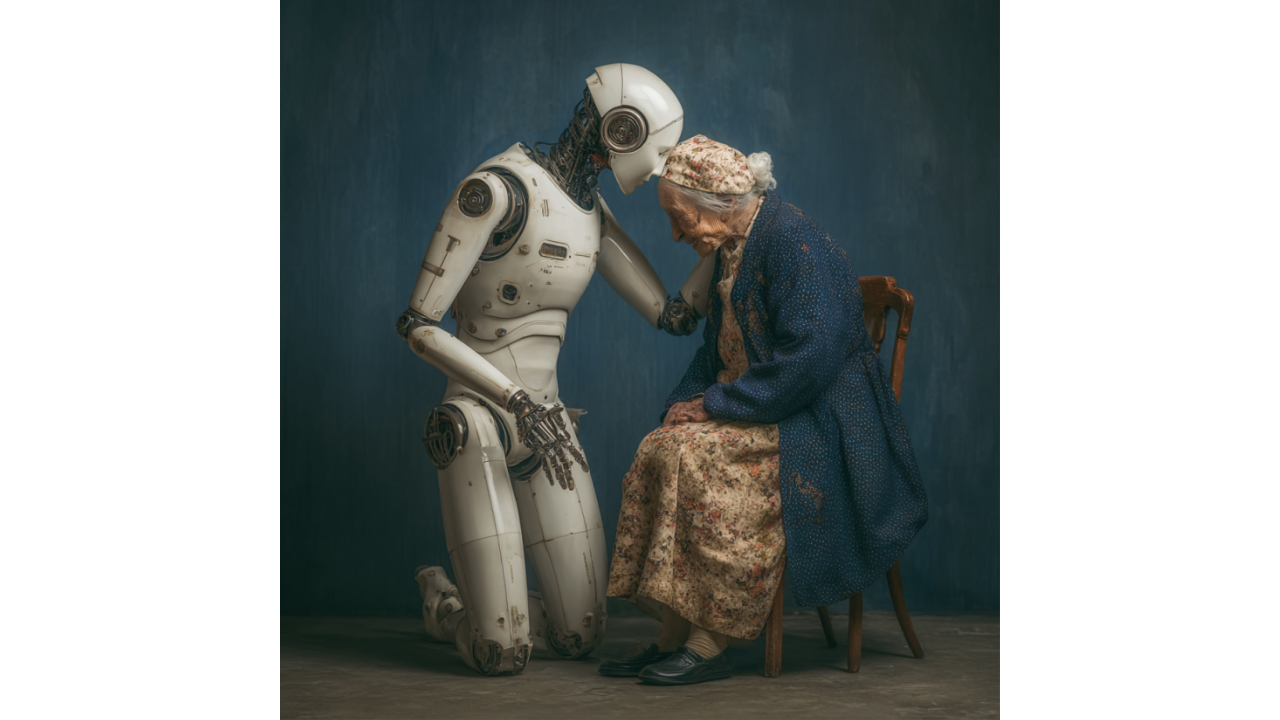South Korea's New AI Laws: What Marketers Need to Know
South Korea just dropped some serious AI regulation news, and if you're using AI in your marketing stack, you need to pay attention. While the...
5 min read
 Writing Team
:
Sep 3, 2025 8:00:00 AM
Writing Team
:
Sep 3, 2025 8:00:00 AM

South Korea has deployed over 12,000 AI-powered dolls across the country, each one designed to be the perfect grandchild—attentive, caring, and always available to chat. These ChatGPT-powered companions, called Hyodol, represent far more than a technological novelty; they're South Korea's pragmatic response to a demographic crisis that's reshaping how we think about aging, caregiving, and the role of artificial intelligence in human relationships. As the country races toward becoming a "super-aging society" with one in five citizens over 65, Hyodol dolls offer a glimpse into a future where AI fills the gaps left by changing family structures and caregiver shortages.
The numbers behind South Korea's AI companion initiative reveal both the scale of the problem and the pragmatism of the solution. At approximately $1,800 per unit plus monthly subscriptions, a Hyodol doll costs significantly less than hiring human caregivers—a critical consideration when South Korea faces a caregiver shortage of 190,000 positions, expected to balloon to 1.55 million by 2032.
The dolls perform multiple functions that would typically require human staff: medication reminders, health monitoring, emergency alerts, and most importantly, companionship. An infrared sensor on the doll's neck detects movement; if no activity is registered for 24 hours, it automatically alerts social workers. A microphone records daily conversations about mood and wellbeing, with Microsoft AI analyzing voice logs to assess emotional states and flag concerns to human caregivers.
This isn't just cost-cutting through automation—it's creating a scalable care model that acknowledges the reality of modern demographics. When 81-year-old Kim Jeong-ran, a retired subway worker living alone in Seoul, cradles her Hyodol and says "I love you," receiving "Grandma, I love you too" in response, she's experiencing a form of care that wouldn't otherwise exist given current resource constraints.
Perhaps the most striking aspect of the Hyodol phenomenon is how deeply users bond with their artificial companions. Social workers report that elderly users treat the dolls like actual grandchildren—steaming sweet potatoes for pretend meals, dressing them in embroidered hats and family heirloom necklaces, and cradling them to sleep. Some seniors become so attached that they request to be buried with their Hyodols, while others show up anxiously at the company's headquarters when their dolls are taken for repairs.
This emotional investment isn't accidental—it's engineered. The dolls are designed to appear seven years old, triggering grandparental instincts while using ChatGPT's conversational abilities to create seemingly meaningful exchanges. They respond to touch, remember previous conversations, and even simulate embarrassment with neon red cheeks when complimented.
The result is what researchers call "simulated intimacy"—relationships that feel genuine to users despite being entirely artificial. For isolated elderly people, these interactions provide comfort and purpose that might otherwise be entirely absent from their daily lives. The question is whether this represents authentic care or elaborate deception.
Hyodol's name derives from the Confucian concept of "hyodo"—the path of filial respect that traditionally governs care for elders in Korean society. This cultural grounding reflects the company's understanding that they're not just selling technology, but providing a digital interpretation of traditional family obligations that modern society struggles to fulfill.
South Korea's demographic transition has been particularly rapid and severe. The country has one of the world's lowest fertility rates, competing with Japan and Taiwan, while simultaneously experiencing dramatic social changes that have altered traditional family structures. Adult children often live far from elderly parents, work demanding schedules that leave little time for caregiving, or simply lack the skills needed for complex health management.
In this context, Hyodol dolls don't replace family relationships—they fill voids where those relationships can't practically exist. The dolls serve as a bridge between traditional values of elder care and contemporary realities of work, geography, and family size.
While users focus on companionship, Hyodol dolls are simultaneously conducting comprehensive surveillance of their users' daily lives. The dolls record intimate conversations, monitor physical activity, assess emotional states, and transmit all of this data to centralized systems where it's processed by AI algorithms and reviewed by human caregivers.
This surveillance capability has proven lifesaving—Hyodol dolls have detected suicidal ideation in users and automatically notified social services. They've identified health emergencies, medication non-compliance, and cognitive decline before these issues would have been apparent to distant family members or overworked social workers.
But the same capabilities raise significant privacy concerns. Cybersecurity experts worry about intimate conversation data being processed on third-party servers, while ethicists question whether elderly users truly understand the extent to which their AI companions are monitoring and reporting their behavior.
The tension reflects a broader challenge in AI-powered healthcare: the technologies that provide the most benefit often require the most invasive data collection practices.
South Korea's Hyodol experiment is part of a larger global trend toward AI-powered elder care. Japan has developed Paro, a therapeutic robot seal that provides comfort through purring and blinking. Singapore offers Dexie, which plays music, sings, and provides cognitive training. In the United States, ElliQ serves as an AI companion lamp for elderly users.
The market for elderly care robots is projected to reach $7.7 billion by 2030, driven by aging populations worldwide and persistent caregiver shortages. Hyodol's FDA registration and planned U.S. launch in 2026 positions the company to capture a significant share of this expanding market, particularly as American baby boomers age into increased care needs.
The success of these technologies suggests that the question isn't whether AI will play a larger role in elder care, but how to deploy these systems in ways that enhance rather than diminish human dignity and connection.
Critics argue that AI companions like Hyodol represent a fundamental category error—mistaking simulation for genuine relationship and technological convenience for human care. The concern is that elderly users who prefer interactions with AI dolls may become even more isolated from actual human contact, substituting artificial affection for the messy, imperfect, but authentic relationships that characterize real human connection.
This critique has philosophical merit, but it may miss the practical reality facing millions of elderly people worldwide. For users like Kim Jeong-ran, living alone with cabinets full of medicine and walls covered in photos of distant grandchildren, the choice isn't between AI companionship and human companionship—it's between AI companionship and no companionship at all.
The Hyodol dolls provide structure, routine, conversation, and emotional warmth in situations where these elements would otherwise be absent. Whether this constitutes "authentic" care may be less important than whether it improves users' quality of life, health outcomes, and sense of purpose.
South Korea's experience with Hyodol dolls offers a preview of how AI might reshape care infrastructure globally. Rather than replacing human caregivers entirely, these systems create hybrid care models where AI handles routine monitoring, companionship, and basic health management while human professionals focus on complex medical decisions, emergency interventions, and relationship building.
The economic logic is compelling: AI systems can provide 24/7 monitoring and companionship at costs dramatically lower than human equivalents, while generating data that helps human caregivers prioritize their limited time more effectively. The social worker monitoring dozens of Hyodol users through smartphone alerts can intervene quickly when AI algorithms detect concerning patterns, rather than waiting for scheduled visits to identify problems.
This approach acknowledges that traditional models of elder care simply don't scale to demographic realities. Countries worldwide face the choice between developing technological solutions like Hyodol or accepting that growing elderly populations will receive inadequate care due to resource constraints.
The ultimate test of AI companions like Hyodol isn't whether they perfectly replicate human relationships, but whether they serve human flourishing in contexts where alternatives are limited or absent. For elderly users who find comfort, routine, and purpose in caring for their artificial grandchildren, the technology succeeds regardless of philosophical debates about authenticity.
The challenge moving forward will be ensuring that AI companions enhance rather than replace opportunities for genuine human connection. Hyodol dolls work best when they're part of broader care ecosystems that include human social workers, family contact, and community engagement—not as substitutes for these relationships, but as bridges that help maintain them.
South Korea's digital grandchildren represent both the promise and the peril of AI in human relationships. They offer companionship to those who need it most, while raising fundamental questions about what we lose when we outsource care to machines. The answer may depend less on the technology itself than on how thoughtfully we integrate it into the broader project of creating societies that support human dignity across the lifespan.
Develop AI solutions that enhance human connection rather than replace it. Winsome Marketing's growth experts help you implement AI technologies that support authentic relationships while solving real business challenges. Let's build systems that bring people together.

South Korea just dropped some serious AI regulation news, and if you're using AI in your marketing stack, you need to pay attention. While the...
-3.png)
For two years, we've been watching ChatGPT get smarter at everything except the one thing that matters most at work: knowing what's actually...

Sam Altman just announced that OpenAI will roll out a personalization hub for ChatGPT within the next couple of days, consolidating previously...